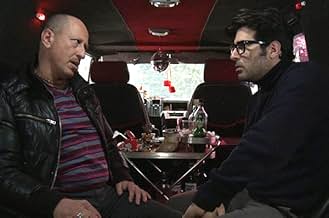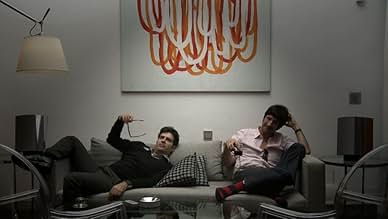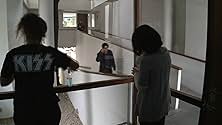IMDb RATING
7.1/10
4K
YOUR RATING
A small incident over two neighbors common wall sparks a conflict which affects the intimacy of the view over the chimney; the protagonist sparks a conflict and with paranoiac obsession dest... Read allA small incident over two neighbors common wall sparks a conflict which affects the intimacy of the view over the chimney; the protagonist sparks a conflict and with paranoiac obsession destroys everyday life.A small incident over two neighbors common wall sparks a conflict which affects the intimacy of the view over the chimney; the protagonist sparks a conflict and with paranoiac obsession destroys everyday life.
- Directors
- Writer
- Stars
- Awards
- 14 wins & 11 nominations total
- Directors
- Writer
- All cast & crew
- Production, box office & more at IMDbPro
Featured reviews
I saw this movie about 10 years ago and Liked It very Much.
I rewatched It today and like It even more. It doesn't get older, it is truly alive., deserves more prestige.
It is an excellent hilarious drama turning around on a simple conflict (an ilegal window), in appearance! Because this is a story about the way the people defends their beliefs, their status, their contradictions (Leonardo hates and in the same time, admires Victor), their desires (Víctor Not only wants light from the outside, he loves to be aceptted as he is, in this other sophisticated world), the real value of things, the sensation of emptiness, the absurd success, and the power abuse.
Some people say scenes are slow, but in this film happens too many things and you never got quiet, you are Always with a 'what the f..k'? Question in your mind.
All the cast is great, but the Rafael Spregelburd performance is absolutely amazing, particulary the story he relates at dinner with some friends. Few times I've seen an actor with such a credible character. The scripy helps him: Duprat is a Genius writer, the dialogs are Always fluid, reliables, they Talk as real people, when most of the directors and writers fall in laziness checking the dialogues of the films; these NEVER happens here, all detalls are controllled.
Thank you Mariano and Gaston for this movie.
You made me happy -again- with this smart film.
I rewatched It today and like It even more. It doesn't get older, it is truly alive., deserves more prestige.
It is an excellent hilarious drama turning around on a simple conflict (an ilegal window), in appearance! Because this is a story about the way the people defends their beliefs, their status, their contradictions (Leonardo hates and in the same time, admires Victor), their desires (Víctor Not only wants light from the outside, he loves to be aceptted as he is, in this other sophisticated world), the real value of things, the sensation of emptiness, the absurd success, and the power abuse.
Some people say scenes are slow, but in this film happens too many things and you never got quiet, you are Always with a 'what the f..k'? Question in your mind.
All the cast is great, but the Rafael Spregelburd performance is absolutely amazing, particulary the story he relates at dinner with some friends. Few times I've seen an actor with such a credible character. The scripy helps him: Duprat is a Genius writer, the dialogs are Always fluid, reliables, they Talk as real people, when most of the directors and writers fall in laziness checking the dialogues of the films; these NEVER happens here, all detalls are controllled.
Thank you Mariano and Gaston for this movie.
You made me happy -again- with this smart film.
The film attempts to tackle a relevant theme but ultimately fails in its execution. The only part that truly stands out is the ending, which was fair, but it doesn't justify the time I wasted. Regarding the theme itself, it's frustrating to see how laws exist only on paper and are merely for show, which explains the perpetual stagnation of Latin American countries. While the characters and plot are believable, the repetitive cinematography and excessively long scenes make the film a tedious experience. Moreover, despite being marketed as a thriller, it's more of a drama with touches of comedy, one of the genres I detest the most.
Very original, ironic and thought-provoking movie. The film direction is amazing. The setting is the house built by Le Corbusier in La Plata.
I agree with another rewiewer here that this movie would be a nice shortfilm. The characters and the plot are believable, the acting is very natural, the cinematography is good but very repetitive. Some scenes are annoyingly long with no reason. I wasted two hours of my life watching this long "short".
This fourth collaboration between Argentinians Mariano Cohn and Gastón Duprat is a drolly ironic study of bourgeois insecurity in which the viewer's sympathies gradually shift from the apparent protagonist to his apparent enemy -- a crude neighbor who shatters his calm by knocking out a hole in a wall facing and adjoining his especially perfect house.
All focus is on Leonardo (Rafael Spregelburd), a successful designer who lives with his wife and teenage daughter in the university town of La Plata, Buenos Aires in what is essentially a museum: a Le Corbusier house, the only one in Latin America. It's a real house: it's called the Curutchet House. It is ample and meandering; we never get a look at all of it at once. One of its windows faces a white wall. That wall belongs to a house. Behind that wall, in an apartment, is a macho, gravel-voiced used car salesman called Victor (Daniel Aráoz). This man is remodeling, and he wants a bit of light. The film begins with a big sledge hammer knocking a hole in the wall.
At first one's sympathies are with Leonardo, especially if one has ever had to deal with nosy, intrusive, or annoying neighbors, as many of us have. Victor could be doing anything, chopping down a tree, building or destroying a fence, even harboring a noisy dog.
The sly part comes when the personalities of Leonardo and Victor are combined; because, try as he might to keep it cold and businesslike, Leonardo can't stop Victor from being friendly and insisting they discuss the issue "as friends" in a café. Sure, Victor is a bit crude, and this is, typically for an Argentinian film, largely about class. But the class Leonardo increasingly shows, as the picture builds up, is world class priggishness and Olympic grade cowardice. His self-importance is endless, but nothing he does ever justifies it. Sure, he is a successful designer, but the house only underlines the fact that he's no Le Corbusier. Moreover, he keeps telling Victor he's terribly busy when he's so rattled by the noise (as Victor has the window changed back and forth) that he isn't doing anything. His wife is always on his case, and his daughter is always dancing in her room wearing headphones. Leonardo is even cowardly in the face of his daughter's insolence and and hostility. The Le Corbusier house may be marvelous. People are constantly coming around to photograph it and annoying Leonardo by even sometimes asking to be let in (out of the question; but their repeated appearances add to the growing sense of menace, of the crumbling of Leonardo's world). Leonardo resents that the house is listed on Wikipedia (it is; look it up). Victor acts friendly, and so Leonardo pretends to act friendly too, meanwhile making fun of Victor and exclaiming at his presumption and gaucherie to sycophantic friends.
Leonardo began by telling Victor what he's doing was illegal. In fact when he finally consults with a knowledgeable friend it turns out Victor has the right to put in a window. It just needs to be higher up and narrower. But if the law forbids a big squarish wall, when it comes down to actual cases that may be hard to enforce. Too weak to confront Victor on his own or in a café (though he does consent to enter his kitschy van), Leonardo resorts to pretending it's his wife who won't allow the window, and then his father-in-law, who in his lies are far more authoritative and unyielding than he is. It becomes increasingly clear that Leonardo is ineffectual. The hole in the wall was from the start the symbol of his impotence.
Leonardo is an asshole; and so are his wife and daughter. He's also hollow, like the family who inhabiting the modern house of Jacques Tati's Mon Oncle. With all due respect to Le Corbusier, such houses are not cozy, and in both cases people are making things more important than people. Victor (ironically, since he quite lacks Hulot's fey delicacy) is like Monsieur Hulot. He's a human being, and the threat he poses to Leonardo is that he connects on a human level. Leonardo is just a self-important snob. His sense of superiority is focused in his notion that his house is of transcendent importance; that the world belongs to him.
As Victor, Daniel Aráoz's performance is a marvel of control that hovers perpetually and tantalizingly between bonhomie and menace. And the modulation of the film is equally subtle in the way it gradually shifts the viewer's sympathies from Leonardo to his annoying neighbor; the way little by little, Leonardo and his family become the truly and deeply annoying ones.
The Man Next Door is a very simple story: the premise takes such good care of itself that almost any little incident that happens from day to day enriches the situation and adds layers to its implications. This is the story of a process, a gradual meltdown. Victor turns out, in a surprise twist, that, unfortunately, takes the film into another, unrelated genre, to be in fact a very good neighbor indeed. What's good about The Man Next Door is the way it's simultaneously both symbolic (and satirical) and very practical and down-to-earth.
The film (El homre de al lado) has a special cool, flat, grayish look that is elegant and distinctive, and it won the cinematography prize at Sundance. It was in several festivals; is scheduled for release in Argentina in September 2010; and was chosen to be part of the New Directors/New Films series of the Film Society of Lincoln Center and shown at the Walter Reade Theater and at MoMA, March 31, 2010 (MoMA) and April 1 (Walter Reade).
All focus is on Leonardo (Rafael Spregelburd), a successful designer who lives with his wife and teenage daughter in the university town of La Plata, Buenos Aires in what is essentially a museum: a Le Corbusier house, the only one in Latin America. It's a real house: it's called the Curutchet House. It is ample and meandering; we never get a look at all of it at once. One of its windows faces a white wall. That wall belongs to a house. Behind that wall, in an apartment, is a macho, gravel-voiced used car salesman called Victor (Daniel Aráoz). This man is remodeling, and he wants a bit of light. The film begins with a big sledge hammer knocking a hole in the wall.
At first one's sympathies are with Leonardo, especially if one has ever had to deal with nosy, intrusive, or annoying neighbors, as many of us have. Victor could be doing anything, chopping down a tree, building or destroying a fence, even harboring a noisy dog.
The sly part comes when the personalities of Leonardo and Victor are combined; because, try as he might to keep it cold and businesslike, Leonardo can't stop Victor from being friendly and insisting they discuss the issue "as friends" in a café. Sure, Victor is a bit crude, and this is, typically for an Argentinian film, largely about class. But the class Leonardo increasingly shows, as the picture builds up, is world class priggishness and Olympic grade cowardice. His self-importance is endless, but nothing he does ever justifies it. Sure, he is a successful designer, but the house only underlines the fact that he's no Le Corbusier. Moreover, he keeps telling Victor he's terribly busy when he's so rattled by the noise (as Victor has the window changed back and forth) that he isn't doing anything. His wife is always on his case, and his daughter is always dancing in her room wearing headphones. Leonardo is even cowardly in the face of his daughter's insolence and and hostility. The Le Corbusier house may be marvelous. People are constantly coming around to photograph it and annoying Leonardo by even sometimes asking to be let in (out of the question; but their repeated appearances add to the growing sense of menace, of the crumbling of Leonardo's world). Leonardo resents that the house is listed on Wikipedia (it is; look it up). Victor acts friendly, and so Leonardo pretends to act friendly too, meanwhile making fun of Victor and exclaiming at his presumption and gaucherie to sycophantic friends.
Leonardo began by telling Victor what he's doing was illegal. In fact when he finally consults with a knowledgeable friend it turns out Victor has the right to put in a window. It just needs to be higher up and narrower. But if the law forbids a big squarish wall, when it comes down to actual cases that may be hard to enforce. Too weak to confront Victor on his own or in a café (though he does consent to enter his kitschy van), Leonardo resorts to pretending it's his wife who won't allow the window, and then his father-in-law, who in his lies are far more authoritative and unyielding than he is. It becomes increasingly clear that Leonardo is ineffectual. The hole in the wall was from the start the symbol of his impotence.
Leonardo is an asshole; and so are his wife and daughter. He's also hollow, like the family who inhabiting the modern house of Jacques Tati's Mon Oncle. With all due respect to Le Corbusier, such houses are not cozy, and in both cases people are making things more important than people. Victor (ironically, since he quite lacks Hulot's fey delicacy) is like Monsieur Hulot. He's a human being, and the threat he poses to Leonardo is that he connects on a human level. Leonardo is just a self-important snob. His sense of superiority is focused in his notion that his house is of transcendent importance; that the world belongs to him.
As Victor, Daniel Aráoz's performance is a marvel of control that hovers perpetually and tantalizingly between bonhomie and menace. And the modulation of the film is equally subtle in the way it gradually shifts the viewer's sympathies from Leonardo to his annoying neighbor; the way little by little, Leonardo and his family become the truly and deeply annoying ones.
The Man Next Door is a very simple story: the premise takes such good care of itself that almost any little incident that happens from day to day enriches the situation and adds layers to its implications. This is the story of a process, a gradual meltdown. Victor turns out, in a surprise twist, that, unfortunately, takes the film into another, unrelated genre, to be in fact a very good neighbor indeed. What's good about The Man Next Door is the way it's simultaneously both symbolic (and satirical) and very practical and down-to-earth.
The film (El homre de al lado) has a special cool, flat, grayish look that is elegant and distinctive, and it won the cinematography prize at Sundance. It was in several festivals; is scheduled for release in Argentina in September 2010; and was chosen to be part of the New Directors/New Films series of the Film Society of Lincoln Center and shown at the Walter Reade Theater and at MoMA, March 31, 2010 (MoMA) and April 1 (Walter Reade).
Did you know
- TriviaCasa Curutchet is a building by Le Corbusier. It was commissioned by Dr. Pedro Domingo Curutchet, a surgeon, in 1948. In July 2016, the house and sixteen other works by Le Corbusier were inscribed as UNESCO World Heritage Sites.
- How long is The Man Next Door?Powered by Alexa
Details
- Release date
- Country of origin
- Official sites
- Language
- Also known as
- The Man Next Door
- Filming locations
- La Plata, Buenos Aires, Argentina(General location)
- Production companies
- See more company credits at IMDbPro
Box office
- Gross worldwide
- $1,319,924
- Runtime1 hour 50 minutes
- Color
- Sound mix
- Aspect ratio
- 1.85 : 1
Contribute to this page
Suggest an edit or add missing content


![Watch Tráiler [OV]](https://m.media-amazon.com/images/M/MV5BZWFiYjgwZmMtNDJjZi00MTQxLTg3MzMtNjU2YjQ3MDhkYzYxXkEyXkFqcGdeQXRodW1ibmFpbC1pbml0aWFsaXplcg@@._V1_QL75_UX500_CR0)



















